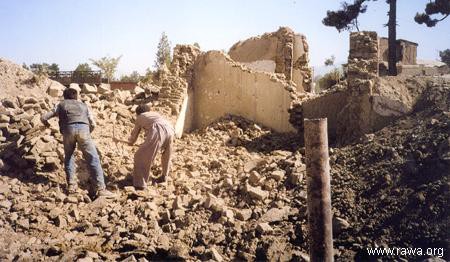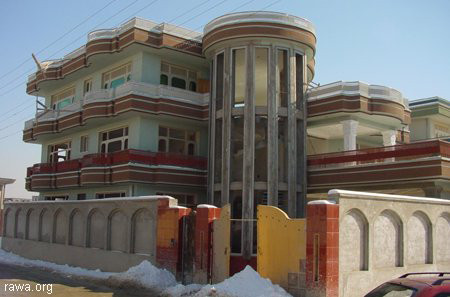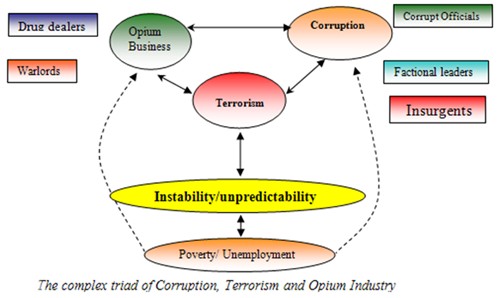RAWA News, November 27, 2008
Corruption and Warlordism: A critical review of Corruption situation in Afghanistan
Corruption has become part of a complex triad (corruption, opium economy and terrorism) where warlords, insurgents, factional leaders, corrupt officials and drug dealers are contributing to its sustenance.
By Abdul Basir Stanikzai
Similar to many South Asian and African Countries, Afghanistan is also a victim of corruption that is believed to be the most challenging and acute problem in addition to drugs and terrorism. It has posed a serious threat to the legitimacy of the state, trust of the public, process of development and democratization, and the effectiveness of foreign aid. The United Nations Special Representative for Afghanistan Mr. Kai Eide has highlighted on 28th August 2008 that:
“Corruption in Afghanistan is endemic; it hurts the poorest people disproportionately, pushes people away from the state and undermines our joint efforts to build peace, stability and progress for Afghanistan’s peoples”
In addition, latest survey by Integrity Watch Afghanistan (IWA) in 2006-2007 revealed that more than 50 percent of the household in 13 provinces have paid bribe in the last six months to the government officials to obtain certain services. In addition, other findings by the same source show that majority of the public (41%) perceives the justice sector as the most corrupt followed by security (20%), customs (15%) and municipalities (13%). Similarly, Corruption Perception Index of Transparency International (2005) ranks Afghanistan near the bottom of 150 countries worldwide.
Corruption in Afghanistan was a taboo and untouchable dilemma right until the end of 2003 despite government’s commitment in series of international and national occasions to combat corruption. After the government became signatory to the United Nations Convention Against Corruption (UNCAC), it established an Independent Administration of Anti-Corruption (GIAAC) in Dec 2003. GIAAC was mandated to develop a foundation for fight against corruption by establishing regional offices in the country, drafting anti-corruption law and policies, investigating corruption cases in the government institutions and soliciting support from the Police and Attorney General Office to arrest and prosecute corrupt officials.
However, soon after it started its activities and filed cases of embezzlement of millions of US dollars from the national treasury and international aid, GIAAC’s leadership was forced to soften its approach and do not touch warlords and big fishes. The President himself, according to the former head of GIAAC, Mr. Zabihullah Esmati, has intervened and exempted several high level corrupt officials. The exemption of 6 key government officials, through a Presidential Decree, accused for corruption and fraud in the 2003 Haj ceremony is one example of government’s inability to implement law and dismantle safe heavens for corrupt perpetrators.
Similarly, days after the completion of his preliminarily findings of corruption and embezzlement by the prosecutors, the former Education Minister Mr. Qanooni (now speaker of the parliament) got a special exemption from the President to burn out his files in the General Administration against Corruption. Mr. Qanooni was accused for embezzling more than US$30 million in the procurement of furniture for the Ministry of Education and printing new books when he was the minister of education 2002-2003.
In addition, pardoning Marshal Qasim Fahim and Younus Qanooni for grabbing the land of innocent civilians in Sherpur of Kabul is another example that encouraged competition among other warlords such as Dostum and Karim Khalili to further surmount national and international funds and construct palaces in the same vicinity.
“We wanted to arrest a really terrible warlord, but we couldn't do it because he is being protected by a particular country. We found out that he was being paid $30,000 a month to stay on his good side. They even used his soldiers as guards …” According to Der Spiegel he was indirectly referring to the German Forces in Badakhsan supporting Commander Nasir Mohammed.
This deliberate fostering of culture of impunity was based on political compromises as the President did not want to offend warlords and criminals by punishing the members of their syndicates. This approach of the government offered the most conducive medium for corrupt officials and culprits to get protected in the criminal networks and safe havens.
Criminal warlords, human rights violators, kidnappers, and notorious commanders who are currently in the state institutions or have their members of their networks actively working in key government positions further deepened this problem.
International and national experts highlight some subsidiary elements that have caused failure to the fight against corruption such as poor legislations, limited capacities, uncoordinated institutional arrangement, corrupt judiciary and corrupt law enforcement agencies. However, they tend to forget the most fundamental elements which are lack of political will and the presence of notorious warlords in the government machinery. They are the real causes for failure of anti-corruption efforts in the country.
Its roots reaches back to the legacy of the previous so called administration or vacuum of legitimacy as Mr. Venderall, the former European Envoy to Afghanistan, termed it. When the Taliban regime collapsed due to US bombardment, there was a massive delay between the installation of an illegitimate government under Rabbani and the Bonn accord and by then more than half of the country got back to the hands of former warlord, criminals and Jehadi commanders. These Warriors came to power and they fostered a culture of lawlessness, looting, corruption, nepotism, racism and land grabbing.
It is true that corruption is a treatable cancer but it requires a firm stand (political determination), committed leadership, strong legislations, public support, and a clear institutional set up. Furthermore, it order to enlist citizens’ support, you need to showcase some examples by punishing the “untouchables” those who have stashed away millions of US dollars during their power and are still involved in organized crimes and criminal activities.
The former Attorney General Mr. Abdul Jabar Sabit was mandated by President Karzai to crack down corrupt officials in the government engine. However, when he would investigate some high level government officials, President Karzai himself would call the Attorney not to touch the mayor of Herat because Hazrat Mujadidi would get upset.
If Warlordism fuels corruption, terrorism, lawlessness, human rights violation and instability in the country then who is nurturing warlordism? The answer is: many of the international partners, coalition forces and donor community.
Empirical evidence shows that more 70 percent of the rented houses in the capital cities belong to former warlords, notorious commanders and factional leaders. The buildings in Sherpur, for instance, which were grabbed by forced from the innocent civilians, are mostly possessed by Marshal Fahim, Karim Khalili, Rashid Dostum, Younis Qanooni, Anwar-ul-Haq Ahadi, Baba Jan and other criminals and leased by many private companies, donors, International NGOs and UN projects. These international partners have rented tens of expensive vehicles owned by these criminal gangs and pay thousands of US dollars to their owners.

BBC, Sep. 12, 2003: Miloon Kothari, appointed by the United Nations Commission on Human Rights to investigate abuses in Afghanistan, announced that various government ministers including Fahim and Education Minister Younis Qanooni were illegally occupying land and should be removed from their posts.
Sherpur Scandal ( http://www.rawa.org/land.htm ) | Buildings of Afghan Ministers and Warlords ( http://www.rawa.org/kab-jan05/build.htm )
 ( http://www.rawa.org/kab-jan05/build.htm )
( http://www.rawa.org/kab-jan05/build.htm )Chicago Tribune, March 16, 2008: Instead of calling the fancy neighborhood in Kabul "Shirpur," which means "child of a lion," Afghans now call it "Shirchoor," which means "looted by lions." English speakers describe the architecture style as "narco-tecture."
Sherpur narco-mansion: Gap between rich and poor in Kabul ( http://www.rawa.org/images/h_kabul.htm )
Similarly, the United States military base in Bagram Airbase have contracted out the supply of their food commodities and equipments to a notorious and ill-famous commander and head of northern militia General Baba Jan and so many other examples.
Corruption has become part of a complex triad (corruption, opium economy and terrorism) where warlords, insurgents, factional leaders, corrupt officials and drug dealers are contributing to its sustenance. This has resulted into unstable and unpredictable situation and ultimately to poverty and unemployment. Evidence shows that Chiefs of Police and key officials in the Ministry of Interior including the former Minister Mr. Zarar Muqbil and the Deputy Minister Mr. Daoud are deeply involved in the drug trafficking in return for huge bulk of money from the drug mafia.
Police receives 100 times more bribe to facilitate the trafficking than his/her government salary; hence, diverting his moral responsibilities of providing security and safety to the people.
The Afghanistan National Development Strategy (2008) analyzes that such a culture of lawlessness and immunity before rule of law and justice have resulted into a situation where foreign and domestic investors hardly put their money into this ravaged country which ultimately fosters poverty, unemployment and reduced economic growth.

With such a widespread presence in the government including parliament, cabinet, judiciary and other key official positions, warlords stand united against the interest of the Afghan people by sabotaging peace and security and fostering a culture of lawlessness. They have ensured their safety through protected networks, and safe heavens in the capital as well as in the provinces. Hence in order to dismantle these syndicates and protected network, the following measures are commendable to be taken into account.
- To be more realistic, it is only a phobia that warlords might have power to destabilize the normal situation if they were to be punished. But the truth that public is not behind them, they rule by gun and money so if the international community truly and courageously joins hands with the Afghan government and seize both of them, they can simply get rid of these notorious elements.
- In addition, a simple remedy to such anarchy would be to block the routes of supply of these criminal gangs by cancelling contracts, pulling out of their homes, and terminating the rental of their vehicles.
- It is crucial to revitalize efforts for the implementation of Transitional Justice that ban and delegitimize the participation of warlords in the political process.
- No more compromises as it is the only poisonous measure contributing to the increase of culture of impunity and increase violence.
- Speed up the implementation of Disarming Programme (DIAG) while soliciting strong support from the coalition forces against every single warlord even those who are currently on the government posts.
- The international community could contribute in the seizure of their money and property outside and inside the country.
Unless the international community and the Afghan government truthfully take the issue of warlordism seriously, they would have little chance of bringing peace and security or winning the war against terror and insurgency as warlordism and terrorism are indivisible concepts which are feeding each other.
Characters Count: 14033
